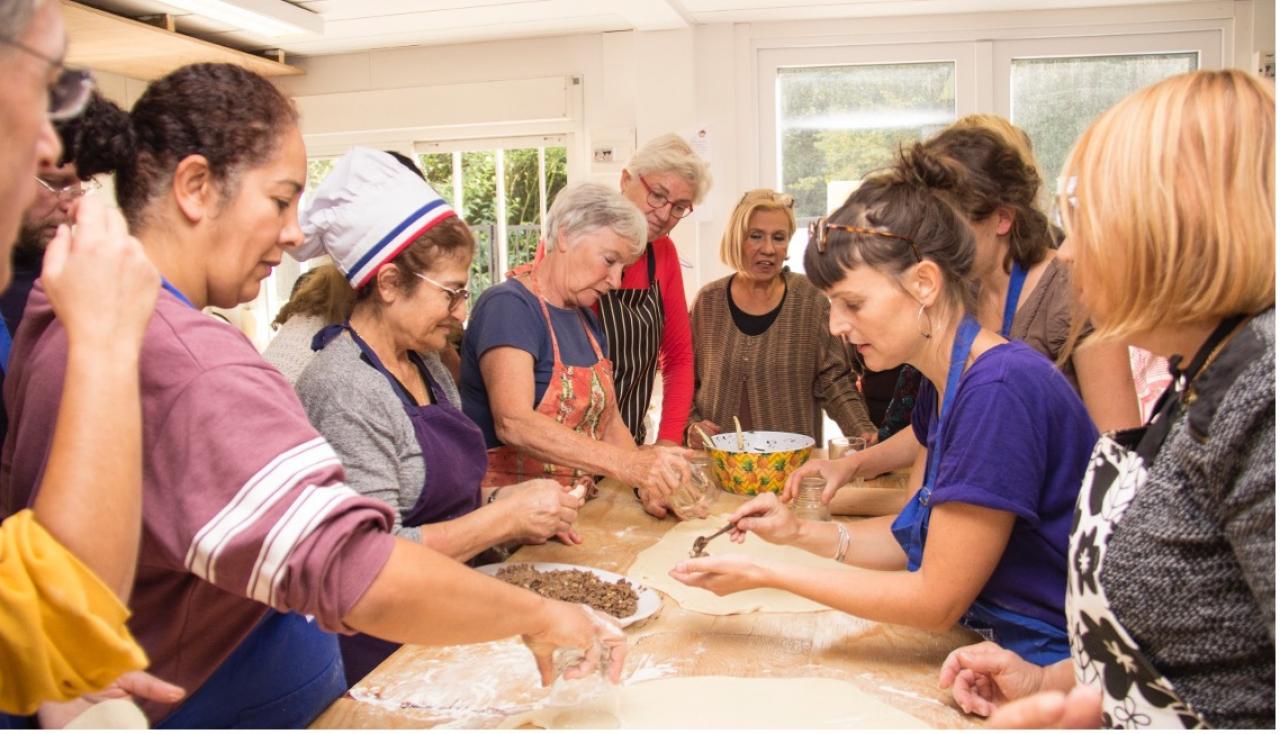Over the last five years, the French town of Mouans-Sartoux has reduced the carbon impact of its inhabitants by more than 20%! How? Simply by changing the way they eat! On 21-22 March, Mouans-Sartoux will welcome hungry participants to the URBACT and European Urban Initiative EU City Lab on Changing Habits for a Healthy and Sustainable Food System.
This article will review the main points of the local food ecosystem and their role in the transformation of eating behaviours. It will draw on the case of several cities to illustrate the multiple entry points into this ecosystem.
The jewel of the cote d'azur
Mouans-Sartoux has considerably reduced the consumption of processed industrial foods, meat and doubled the consumption of organic and local products compared to the French average!
During an interview conducted as part of the Transfer Study of the URBACT BioCanteens in 2018: “In Mouans-Sartoux, we don’t ask ourselves if there is something happening today regarding food, but what is happening? …because the city organises something every day!”. The enthusiasm of Delphine Boissin, from the Parents' Committee of one of the city's three primary schools, is indicative of what we could call a “local ecosystem of healthy and sustainable food”. Mouans-Sartoux, leader of the URBACT BioCanteens Transfer Network (BioCanteens #1 and #2) is best known for these three canteens which serve 1,000 self-produced local and organic meals every day, thanks mainly to its municipal farm. But these jewels make the international reputation of this small town of around 10,000 inhabitants, located on the French Côte d’Azur between Cannes, Grasse and Antibes. What Delphine emphasises is that her little boy lives in an environment where quality food is a permanent and widespread concern, and this is what will lead him to adopt healthier and sustainable eating habits throughout his life!
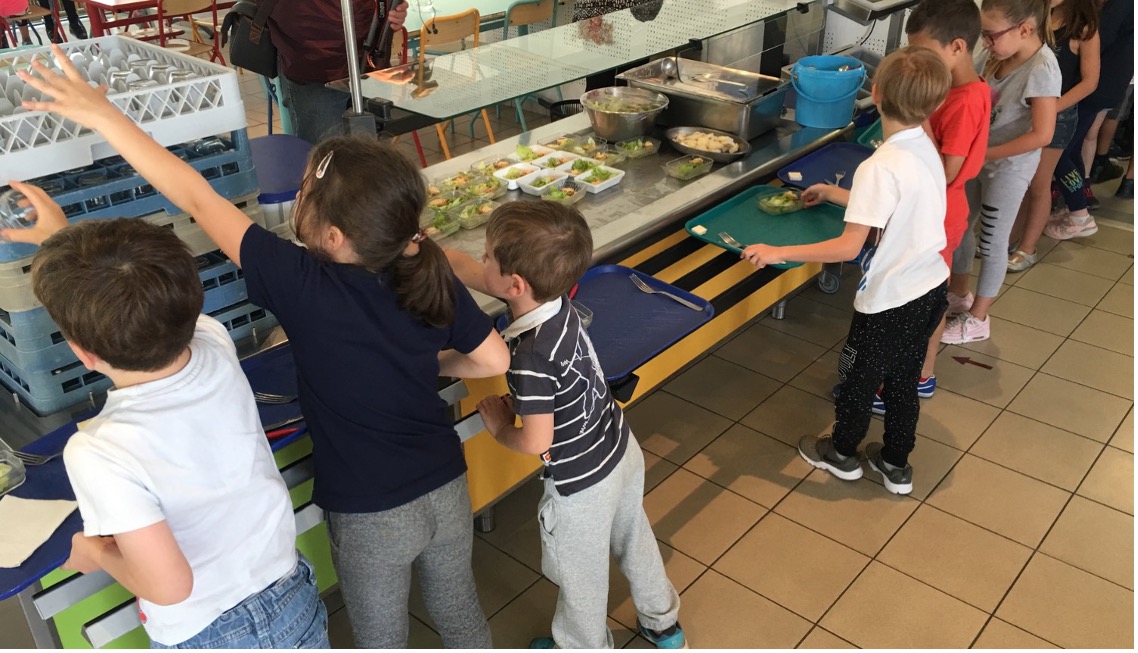
Local and organic canteen is the school of healthy and sustainable food in Mouans-Sartoux (photo credit Mouans-Sartoux)
A local healthy and sustainable food ecosystem
Changing our eating habits is a profound questioning of who we are. Tackling it represents a major challenge for the sustainable transition that European cities face today. Whether because of daily routines, persistence of habits, addiction to comfort, etc., the transition of consumption practices faces significant resistance from citizens. As sociologist Claude Fischler points out in his book, L'Homnivore, this resistance is particularly strong for our diet. This is the phenomenon of “incorporation”: beyond marking a lifestyle, conferring a cultural and religious identity, food constitutes the body of the eater.
Behavioural scientists, who study the factors of resistance to change, emphasise that to transform consumption practices, a systemic approach is needed. Different models resulting from this research can be used by public authorities to define a range of balanced actions. We can use the following simple framework: to adopt a healthier and more sustainable diet, citizens must be aware of its importance both for their health and for reducing the impact on the environment (the motivational dimension). They must be able to access a healthy and balanced diet nearby (the capacity dimension) and finally they must encounter occasions in their life, their neighbourhood to change their practices (the opportunity dimension).
(Re)engage the population with food
Daily meal preparation time for a family of four was, in the 1960s, averaging at 4 hours. Today it has fallen to just over 15 minutes. This apparent gain in efficiency and practicality actually masks a progressive loss of domestic culinary capabilities: frozen foods, ready meals, take-away, etc., as already highlighted within the URBACT network Sustainable Food in Urban Communities in 2012-2014 by cities like Bristol, Brussels and Lyon, a growing part of the population is profoundly disengaged with food.
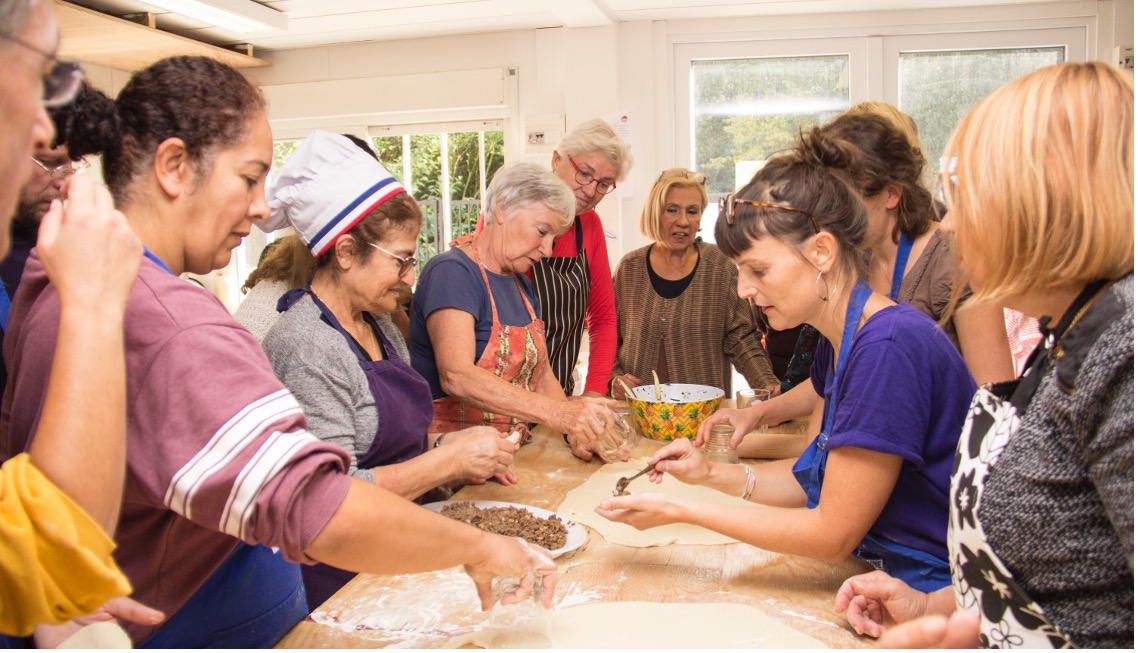
Common solidarity kitchen shared within the “Gourmet Hall”, UIA project Tast'in Fives Cail (photo credit UIA project Tast'in Fives)
Faced with this disengagement, cities are seeking to set up educational programmes in schools, social centres and public places to educate residents about the benefits of a healthy and sustainable diet.
In Lille, the Urban Innovative Action project Tast'in Fives Cail included the establishment of an ecosystem of food activities organised around a “Gourmet Hall”, a shared common “solidarity kitchen”, an incubator around cooking professions, among other things.
Simple education and awareness-raising actions on nutrition, prevention of junk food or the impact of conventional agricultural sectors on health or the environment are necessary to motivate but not sufficient to sustainably transform eating habits. The challenge for cities is to build citizens' capacities by organising cooking workshops, visits to urban farms and culinary events highlighting local products, etc.
Each city is looking for local assets to promote to better engage its population with food. Lyon (FR) for example leveraged in its Territorial food plan its rich gastronomic heritage, involving its renowned chefs and culinary institutions to educate children from a young age about quality food, organising cooking events at street food markets with chefs demonstrating what can be done with ingredients from the surrounding stalls, revisiting traditional recipes to reinvent a more plant-based, light and sustainable gastronomy.
Conversely, in a context less centred on a strong food culture in Helsinki (FI), the Ministry of the Environment carries out actions on the revitalisation of traditional food culture and the promotion of local products “because people must first be interested in food before they can change their consumption habits for a healthier and more sustainable diet.”
Facilitating access to healthy and sustainable food
“Here most of the families who come to see us have never bought a fresh vegetable in their life. They don’t know how to cook it and in any case if they do not have means of transport, they will not find fresh vegetables in the neighbourhood…” for the Hartcliffe Health & Environment Action Group (Hheag) which runs cooking classes in the social centre in the Hartcliffe district of Bristol, changing eating habits also involves ensuring access to quality food in all neighbourhoods of a city. To do this, cities can encourage the establishment of local farmers' markets, organic food stores and food cooperatives in different neighbourhoods. These initiatives provide residents with easier access to fresh, seasonal and locally produced foods, thereby promoting healthier diets and reducing dependence on processed and imported foods. Support for social and solidarity grocery stores, direct sales networks, participatory stores or more ambitious projects, such as experimenting with local social food security systems, make beneficial changes to diet more accessible, regardless of socioeconomic status.
In line with Carolyn Steel's theses in her work Hungry City: How Food Shapes Our Live cities like Montpellier, Lyon or Lille are integrating the food dimension into their urban planning by promoting accessibility to food markets, the installation of local food shops, the creation of restaurants offering local and sustainable cuisine, the development of green spaces conducive to food production and the preservation of agricultural land on the outskirts of the city. Milan (IT) has implemented "Food Districts" in different neighbourhoods of the city, areas dedicated to the promotion of local gastronomy, urban agriculture and quality food products. All of these approaches aim to make food more accessible and more visible in urban spaces.
Changing eating habits also requires cities to take into account the diversity of urban populations. For each cultural community, the preservation of culinary traditions, respect for food prohibitions, the organisation of supply chains for traditional products and specific distribution stores, etc. are strong identity vectors to take into account and activate so that the evolution towards a healthier and more sustainable diet is a reality for everyone. Within its Good Food food strategy, the Brussels-Capital Region places emphasis on promoting culinary diversity by supporting a multitude of initiatives such as the Green Canteen project of “social catering” associated with “cooking workshops” and “solidarity meals” or training for professionals in the health and social sector by focusing on food adapted to the social and cultural diversity of their audiences.
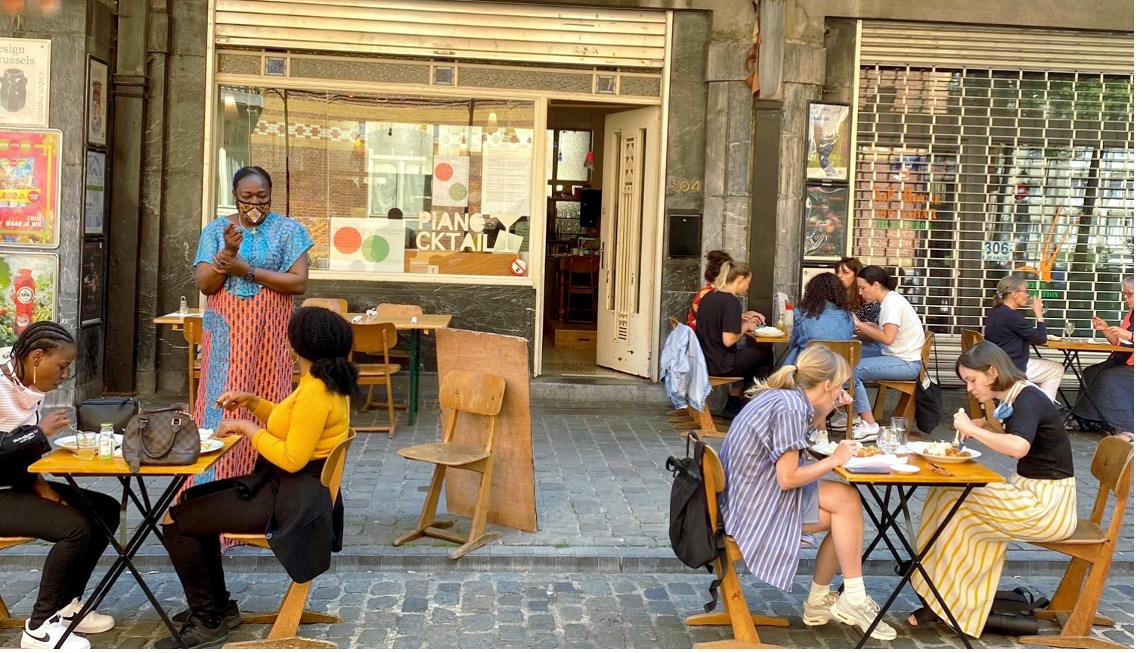
Green Canteen Project provides a catering service at free prices, for citizens and institutions working for social projects, “workshops” places to meet, share and learn healthy, environmentally-friendly cuisine and enriched with various cultural references and “solidarity meals” table d’hôtes organised in support of projects and events for a fairer society (Photo credit Green Cantine van Brussels)
Participative food governance
Cities are involving their citizens in the elaboration of their local food governance in order to motivate their involvement and concerns on key challenges such as food precariousness, impacts of junk food on health conditions or maintenance of the city food sovereignty. These participative food governance result in adopting policies and regulations that promote the production, distribution and consumption of healthy and sustainable foods. Such policy measures can involve, among others, strict standards for public canteens and mass catering, restrictions on advertising of unhealthy foods and tax incentives for businesses engaged in delivering sustainable food products.
In Liège (BE), more than 400 stakeholders in healthy and sustainable food such as urban farms, community gardens, peri-urban farms, food cooperatives, etc. created the Liège Food-Land Belt. The city draws on the strength of civil society to promote small-scale food production in urban and peri-urban areas, thereby reducing dependence on food imports and supporting local producers. In 2022, Liège founded the Conseil Politique de l’Alimentation (Food Policy Council) . The initial impetus was to build their food governance, cities equip themselves with participatory bodies made up of experts, civil society actors and citizen representatives, which have the effect of strengthening the involvement of populations in the management of their food.
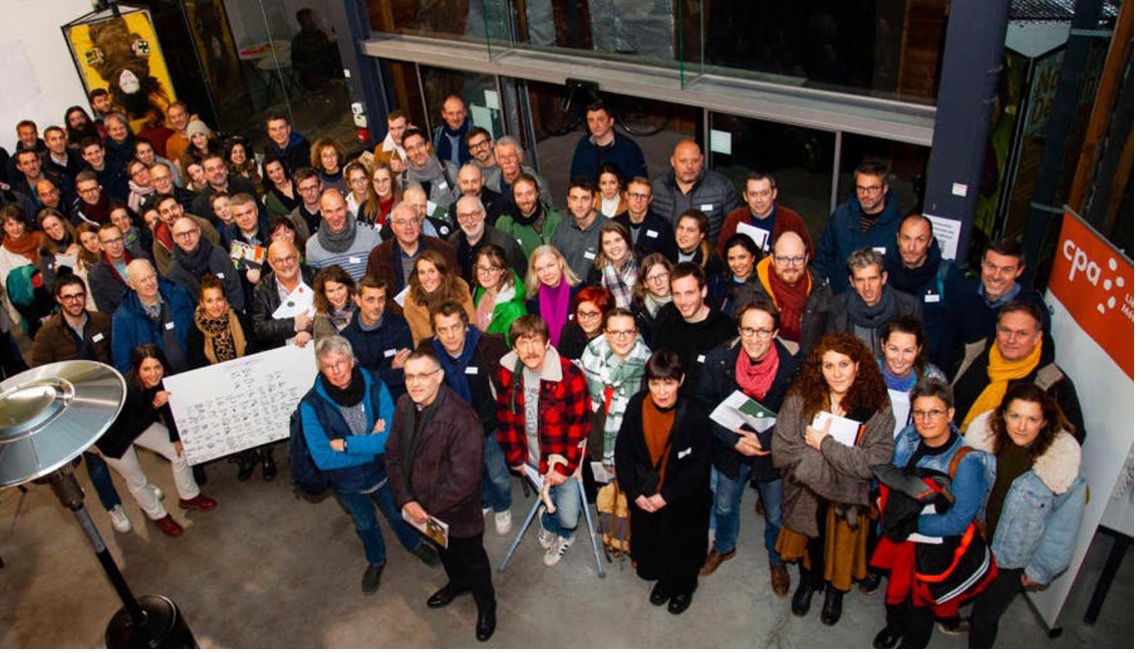
Launch of the Food Policy Council on 8 December, 2022. Initiated by the Liège Food-Terre Belt, the 24 municipalities of the district brought together within Liège-Métropole, and the University of Liège, the CPA aims to coordinate various initiatives which aim at the development of the sustainable food sector in the territory. (Photo credit Liège-Métropole Food Policy Council)
School canteens and municipal administration restaurants have a very important role to play in activating good eating practices. Jumping from Liège back to Mouans-Sartoux, the canteens of the three primary schools are for pupils a real school of healthy and sustainable food: involvement of children with cooks to achieve “0-waste”, demonstration that the savings made in reducing food waste makes it possible to finance quality organic food, tangible experience for the children of the city's food sovereignty project when they pick the fruits and vegetables at the municipal farm that they will eat in the canteen, etc. The children's experience extends to all families who, for example, go so far as to reproduce good recipes from the canteen to cook dishes at home that are healthy, sustainable and appreciated by children.
Systemic approach: To what effect?
But does all this work and what are the effects produced in terms of transforming eating habits? Cities are starting to share the results of evaluating their food transition strategies. For example, the Brussels Capital Region carries out surveys on the evolution of the behaviour of Brussels residents in terms of sustainable food. At the start, mid-term and at the time of renewal of its Good Food #1 strategy reporting progress on multiple dimensions of the local food ecosystem affecting the change in eating habits such as the success of citizen self-production, the labeling of canteens and restaurants, the promotion of short circuits and the dissemination of a quality offer in food businesses. One-third of the 1,000 Brussels residents surveyed in 2016, 2018 and 2020 say they have changed their eating habits over this period of time to consume a lot of sustainable food, but this development is struggling to reach more vulnerable groups, the price of healthy and sustainable food remains the major obstacle for nearly three-quarters of the population.
In Mouans-Sartoux, the study cited at the beginning of the article which covers the period 2017-2022 shows the systemic advantages linked to the development of more sustainable practices within territorialised systems: food represents on average 2t of carbon per person per year in France, it is only around 1.17t in Mouans-Sartoux. The average diet of residents has an impact of 43% compared to the national average and the number of residents eating less meat has increased by 85%.
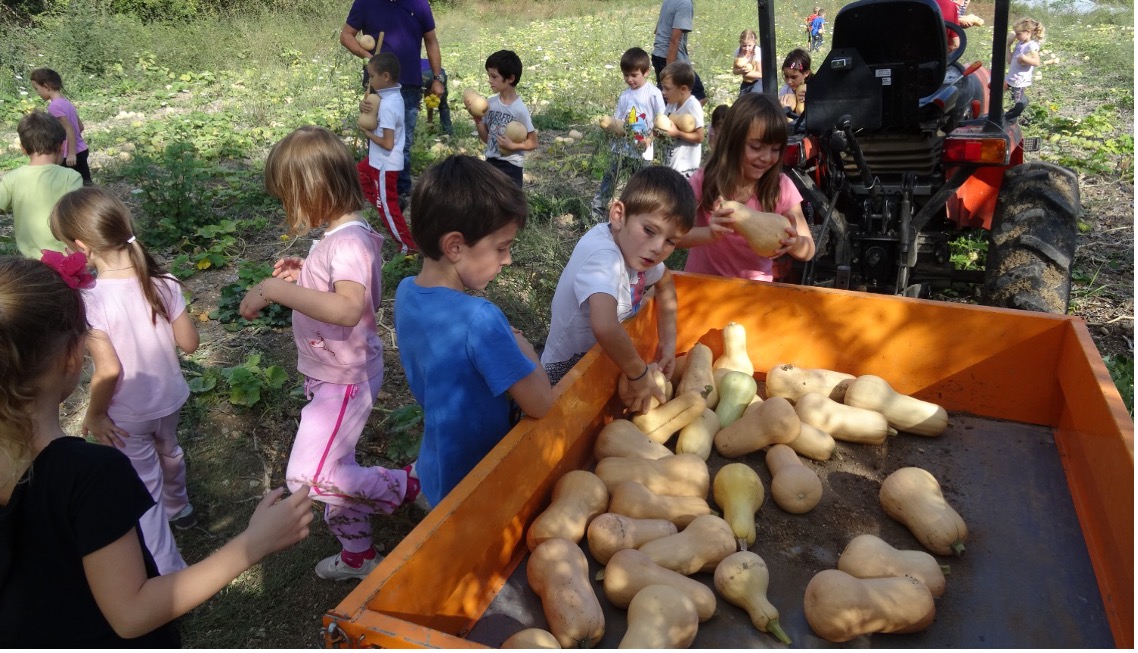
Children from Mouans-Sartoux primary schools who participate in the town's municipal farm in harvesting vegetables that they will soon eat in the school canteen (photo credit town of Mouans-Sartoux)
Cities are leveraging their food assets and capital to activate all these dimensions of their food ecosystem at once. This article shows the variety of possible entry points: organic and local canteens like in Mouans-Sartoux, the gastronomic tradition as in Lyon, the revitalisation of neighborhood food culture as in Lille, citizen participation and awareness of food issues as in Liège, the promotion of culinary diversity as in Brussels, a coordinated commitment of stakeholders and civil society as in Bristol. Other systemic entry points are also possible: food markets as a hub for quality food in neighborhoods like in Lisbon and in Cagliari, the development of urban and peri-urban agriculture as in Montpellier, differentiating approaches for sustainable and inclusive food as in Milan, the promotion of urban beekeeping as inLjubljana, the development of community vegetable gardens such as in Rome, and so on.
EU City Labs: What’s next on the menu?
The examples covered in this article represent entry points that are important to trigger the transition of populations' dietary practices and are intended to remain dominant provided that all these dimensions emerge at once, i.e., a complete ecosystem balancing motivations, capacities and opportunities to change one's food habits.
Later this month, from 21-22 March, Mouans-Sartoux will host the EU City Lab on Changing Habits for a Healthy and Sustainable Food System. The EU City Labs are knowledge-sharing events co-hosted by URBACT and the European Urban Initiative. The Mouans-Sartoux edition is the first of three events taking place in different cities, focused on procurement, agri-food and land use, and other elements for cultivating thriving local food systems in urban areas.
Interested in meeting with other cities, representatives and organisations working on this issue? Consult the full programme and register here.
Want to read more from URBACT experts on food and related topics? Visit the URBACT Knowledge Hub.

